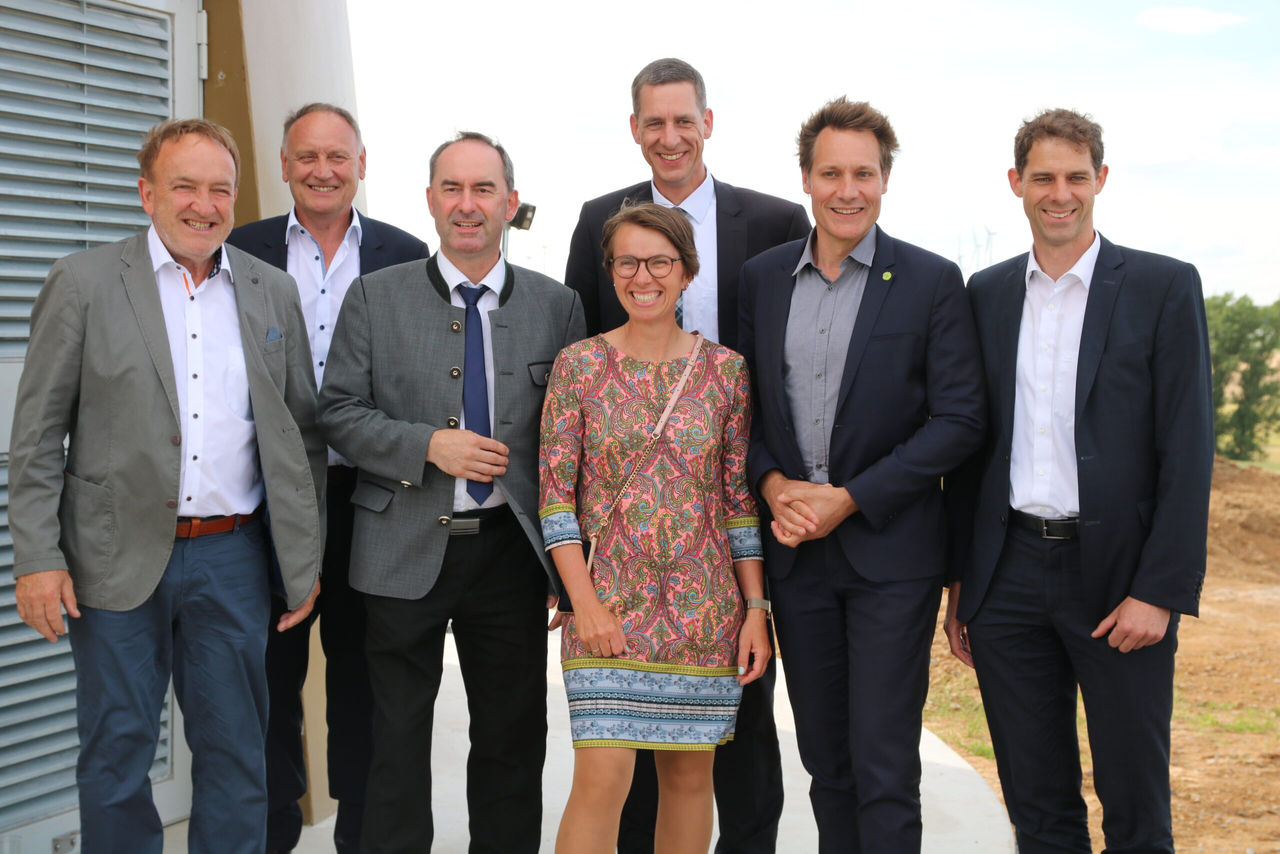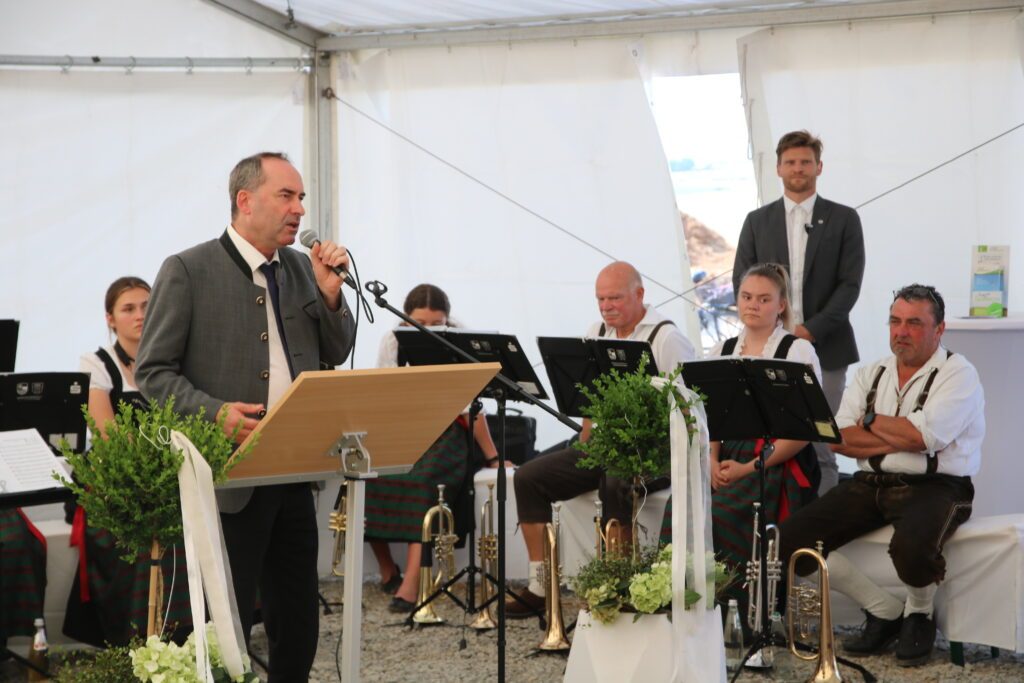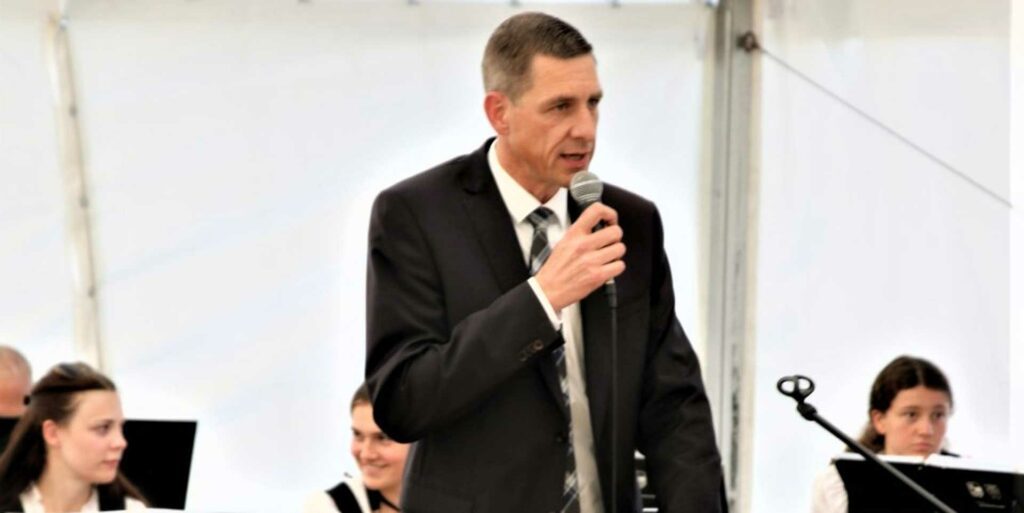Copyright © 2010-2025 Max Bögl. All rights are reserved.
"In view of the tense energy policy situation, the topping-out ceremony for the Weißer Turm wind farm is a signal of independence, optimism and the future"
Hubert Aiwanger, Bavarian Minister of Economic Affairs
The ten wind turbines at the Weißer Turm wind farm in the Wargolshausen / Wülfershausen area have a total installed capacity of 24 megawatts. "For us, the energy transition means generating energy where it is consumed. Here in Bavaria, we have a lot of catching up to do in terms of expanding Wind energy," says Stefan Bögl, CEO of the Max Bögl Group. The company realized the wind farm in cooperation with Wust - Wind & Sonne from Markt Erlbach.
The Weißer Turm wind farm is a genuine community wind farm in which local residents can participate directly as limited partners and thus become owners of the wind farm. The surrounding ten municipalities and the district of Rhön-Grabfeld also benefit from the revenue generated by the ten wind turbines.
Originally, 13 wind turbines were planned, but the wind farm was later optimized to a size of ten turbines in consultation with the municipalities. Nordex N117-2.4 wind turbines were installed on 141-meter-high hybrid towers from Max Bögl. The wind farm is scheduled to be connected to the grid by August 2022. "We see the launch of the Weißer Turm wind farm as a positive sign and an important boost for wind energy in Bavaria. We are particularly proud of its realization due to its complex history," explains Erich Wust, founder and Managing Director of Wust - Wind & Sonne. The topping-out ceremony on June 24, 2022 was also attended by Hubert Aiwanger, Minister of State and Deputy Prime Minister of Bavaria, Ludwig Hartmann, Chairman of the Green Party in the Bavarian State Parliament, and Simone Peter, President of the German Renewable Energy Federation (BEE).
Beginnings with headwinds
The history of the Weißer Turm wind farm in the Wargolshausen / Wülfershausen area dates back to 2012. At the time, the project was initiated by Harald Schwarz and Jürgen Rüth together with the municipalities of Hollstadt, Wülfershausen and Saal an der Saale as a regional contribution to the energy transition. The two citizens of the local communities founded a project company with the Rhön overland utility to realize the specifications in regional hands. The wind farm was approved in April 2014, but citizens' initiatives took legal action and rulings by all instances followed. A modification permit for more modern and more powerful turbines was revoked in 2020 by a decision of the Würzburg Administrative Court. This stated that the modification permit was not feasible due to the 10H regulation. Only the originally planned wind turbines were approved. The investors therefore had to remove foundations that had already been poured for the more modern WTGs in April 2021. Immediately afterwards, the project partners Max Bögl and Wust Wind & Sonne began realizing the wind farm on time in accordance with the original approval.
Bavaria's Minister of Economic Affairs Hubert Aiwanger: "The new wind turbines here in the municipalities of Wargolshausen and Wülfershausen have a long and difficult history behind them; planning and construction were highly controversial and accompanied by legal pitfalls. In future, however, many thousands of households and companies can be supplied with sustainable energy. In view of the tense energy policy situation, the topping-out ceremony for the Weißer Turm wind farm is a signal of independence, optimism and the future. I would like to thank all the citizens involved who have continued to fight for the wind farm despite setbacks. This commitment is the foundation for the energy transition in Bavaria. Max Bögl and Wust - Wind & Sonne recognized the great potential of the wind farm and implemented an exemplary project. As the state government, we have now initiated a comprehensive wind energy reform. Now the many nature and species protection regulations must also be put to the test. We cannot afford to monitor the red kite for several years before a wind turbine is built. Nature conservation and the expansion of renewables are not mutually exclusive."
Sluggish expansion of wind energy in Bavaria
Bavaria must pick up the pace significantly to ensure security of supply with electricity from renewable energies. In the first quarter of 2022, no wind turbines were commissioned in the state, compared to two in the first three months of the previous year, while an average of 23 turbines were commissioned in the first quarter from 2014 to 2018. Similar figures can be found for WTG approvals: They amounted to three turbines in the 1st quarter of 2022, four in the previous year and 40 between 2014 and 2018.
The expansion of wind energy in Bavaria almost came to a standstill, primarily due to the 10H regulation that came into force in November 2014. It states that the minimum distance between a wind turbine and the nearest house must be at least ten times its height.
For modern turbines, this means a distance of around 2,500 meters. Although the state government decided on a reduced minimum distance of 1,000 meters for certain areas in April 2022 due to high political pressure, the CSU wants to continue to adhere to the 10H regulation even under the new federal requirements.
The wind is good
"We should strengthen our sustainable energy sources and use them consistently in order to preserve an environment worth living in for future generations. Particularly in view of the current conflicts, we must be able to guarantee our energy supply much more independently," explains Stefan Bögl and adds: "This wind farm is a real lighthouse project in Bavaria with ten wind turbines at one location. We feel that the energy transition is picking up speed again. This project is proof of that and a visible sign."
Overall, a positive trend for the expansion of renewable energies is now clearly noticeable. The amendments presented in the Easter package create important conditions for wind energy in particular. For example, the expansion rates for onshore wind energy are to be increased to a level of ten gigawatts per year. Wind energy is to be recognized as a contribution to energy security and as a public interest. The federal government's draft legislation presented in the Easter package is currently being passed by the Bundestag. Experts are also expecting concrete changes from the government's summer package, which will follow soon. Each federal state is required to make the areas provided for expansion available. "We can only hope that the energy transition in Bavaria will gain more momentum from the summer and that the Bavarian State Ministry will also create all the necessary conditions for rapid expansion. We are ready for this," says Erich Wust.
Picture credits: Max Bögl Wind AG / Wust Wind & Sonne
Sie haben Fragen zum Artikel?
Kontaktieren Sie uns gerne.



